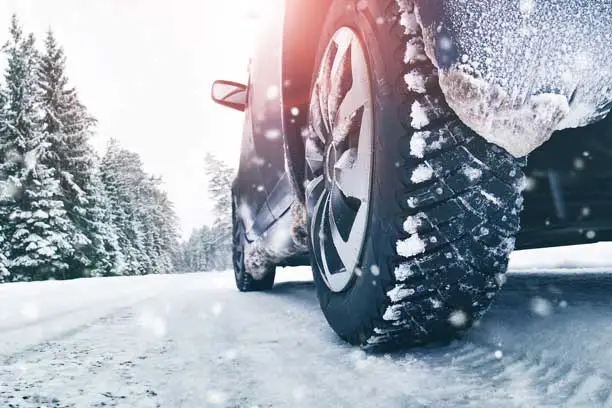Winter Driving Safety: Winterizing Your Car and Other Tips


The ice, sleet, snow and rain of the winter months can wreak havoc on roads, not to mention what salt and studded tires can do to the asphalt. Throughout the winter months, many of us experience the season’s harsh conditions on the highway firsthand. Unfortunately, our vehicles bear the brunt of these weather conditions. Cracks, crumbling roads and road salt can pose threats to our vehicles and tires. Without proper attention, flat tires and car damage due to winter roads can become a regular occurrence — and an expensive one to deal with.
How can you protect your car in the winter from road damage and make sure you get through the cold months safely? Here are some ways to winterize your car, as well as some helpful tips to drive safely on damaged winter roads.
Winterizing your car is an important step that can help prevent winter damage to your vehicle.
If you live in a region where weather conditions drop below freezing temperatures, switching to a thinner oil can help protect your engine. Make sure you refer to your owner’s manual to determine the right oil for your vehicle. Additionally, when the temperature drops below freezing, your vehicle’s battery decreases in capacity. Have your battery tested in the fall to avoid difficulty starting your car on cold mornings.
Winter tires will make your commute easier and safer. But not everyone wants to deal with switching out a set of tires on a regular basis. If it works for your weather conditions, consider a set of all-season tires, which will help your vehicle handle winter roads as well as summer driving.
An emergency kit is an important item to keep on hand in case you wind up in an accident or find yourself stranded. A blanket, flashlight, shovel, road salt (or sand or kitty litter), water and snacks are some of the things you should keep in your emergency kit. A charger for your cell phone will help ensure you can call roadside assistance, too. If you drive a lot, or drive through remote areas, an emergency kit is especially important to have handy — and it doesn’t have to be expensive or difficult to put together. Here’s a comprehensive guide to creating a DIY emergency kit for your car.
Salt lowers the freezing point of water, which melts ice and prevents more from forming. Without salt on the roads during winter storms, there would be many more crashes and spun-out vehicles on the streets and highways.
But unfortunately, using salt to keep the roads drivable is also doing damage to your vehicle. You can’t avoid salt altogether. But to prevent lingering road salt from damaging your vehicle, wash your vehicle's undercarriage regularly throughout the winter and give it a thorough washing in the spring to remove road salt and other de-icing chemicals. You’ll extend the lifetime of your car and keep from having to make costly repairs later.
Wax is often applied to the body of vehicles to protect from rust, but it’s not just a cosmetic treatment. The wax can also be used to seal the undercarriage of your vehicle, helping to prevent winter damage. Rust affects the structural integrity of the body of your vehicle. If you have an accident, you want the body panels and wheel wells to be as strong as possible. Several winters’ worth of road salt can undo the protection your vehicle offers, so be sure to prepare for those salty roads when the weather starts to turn colder.
When your car gets a flat tire, it’s obvious that you have a problem. But repeated bumps on the road can also cause slow leaks, or other issues that aren’t as immediately noticeable.
To guard against problems, watch for these signs of potential vehicle damage. Remember, if you hear any odd clunks, bumps or screeches, get your vehicle serviced immediately.
Unfortunately, situations arise when we least expect them — like when your vehicle won’t start and you’re stranded on the side of the road. The good news is with Farm Bureau Financial Services Roadside Assistance you will be safe day and night when you need it most. Don’t wait until you are in the unfortunate circumstance — learn more about it today!